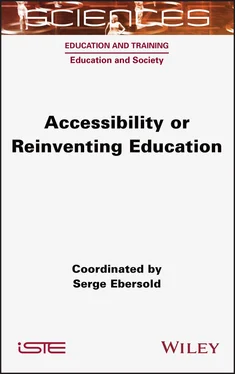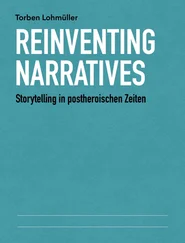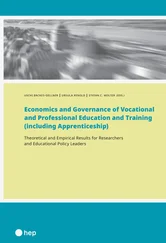1 Cover
2 Title Page SCIENCES Education and Training , Field Director – Jean-Marc Labat Education and Society , Subject Heads – Géraldine Farges and Xavier Pons
3 Copyright First published 2021 in Great Britain and the United States by ISTE Ltd and John Wiley & Sons, Inc. Apart from any fair dealing for the purposes of research or private study, or criticism or review, as permitted under the Copyright, Designs and Patents Act 1988, this publication may only be reproduced, stored or transmitted, in any form or by any means, with the prior permission in writing of the publishers, or in the case of reprographic reproduction in accordance with the terms and licenses issued by the CLA. Enquiries concerning reproduction outside these terms should be sent to the publishers at the undermentioned address: ISTE Ltd 27-37 St George’s Road London SW19 4EU UK www.iste.co.uk John Wiley & Sons, Inc. 111 River Street Hoboken, NJ 07030 USA www.wiley.com © ISTE Ltd 2021 The rights of Serge Ebersold to be identified as the author of this work have been asserted by him in accordance with the Copyright, Designs and Patents Act 1988. Library of Congress Control Number: 2020946951 British Library Cataloguing-in-Publication Data A CIP record for this book is available from the British Library ISBN 978-1-78945-011-8 ERC codes: SH3 The Social World, Diversity, Population SH3_3 Social integration, exclusion, prosocial behaviour SH3_7 Social policies, welfare SH3_11 Social aspects of learning, curriculum studies, educational policies
4 Introduction Introduction Serge EBERSOLD Lise, Conservatoire national des arts et métiers (CNAM), Paris, France Accessibility is undoubtedly a unifying concept that makes it possible to understand the aggiornamento of the school system that accompanies the advent of a societal model that makes the uncertain individual a principle of social organization (Ehrenberg 1995) and knowledge the foundation of its economic and social development (Boltanski and Chiapello 2000). The accessibility of school environments is a social concept that has loomed over educational policies and, more generally, public policies for several decades now; specifically, the promotion of inclusive schools focusing on the well-being and success of every learner and ensuring, to this end, that they are receptive to the diversity of learners’ educational profiles, is at the heart of the democratization of European education systems and goes far beyond the issue of disability (Nesse 2012; Zay 2012). This ideal is part of a reinvention of the school. It invites us to see diversity as a resource beneficial to the smooth running of schools (and, more generally, to the economic and social well-being of societies). It underpins learners’ academic and social commitment to the transformation of school systems or the way they function and, more particularly, to the forms of codification governing the pedagogical relationship between teachers, students and knowledge. It postulates the cognitive autonomy of every learner and, as such, rejects any indifference to difference: it places the causes of difficulties at school, and more generally social difficulties, in the shortcomings of school systems before inferring them from the characteristics of individuals, and reverses the normative frames of reference underlying school functioning. It places the control of educational and social inequalities linked to organizational effects at the heart of the legitimacy of school systems and makes them accountable for their ability to prevent and combat discrimination.
I.1. The school, a vector of social protection because of its accessibility I.2. Accessibility: an imperative legitimized by a dedicated institutional framework I.3. An imperative subjected to orchestration by institutions I.4. An imperative promoting new normative standards I.5. References
5 PART 1: Accessibility as a Societal Imperative 1 The Accessibility Imperative: Outlines and Implications 1.1. Introduction 1.2. Accessibility, or school as a social protection vector 1.3. Accessibility, an imperative focused on the ergonomization of practices 1.4. An ergonomization of practices related to the fight against institutional discrimination 1.5. Accessibility, or the advent of new forms of normativity 1.6. Conclusion 1.7. References 2 Inclusion and Accessibility: 50 Years of Change1 2.1. Introduction 2.2. Developing a continuum of support for promoting accessible learning environments 2.3. Developing accessible learning environments; results of international case studies 2.4. Promoting accountable education systems supporting accessible learning environments 2.5. Conclusion 2.6. References 3 Accessibility Requirements and Evaluation Policies 3.1. Introduction 3.2. New governance of education systems based on performance and social justice 3.3. Evaluation: intellectual movements and political discourse 3.4. Assessment policies and the accessibility imperative 3.5. Conclusion 3.6. References
6 PART 2: How Do Schools Meet the Accessibility Imperative? 4 Educational Accessibility: A Catalyst for Innovative Practices 4.1. Introduction 4.2. The heuristics of innovative teaching practices 4.3. School environments and the pedagogical imperative of accessibility 4.4. Collaboration and accessibility: beyond “mainstream” and “special” 4.5. References 5 School Form and Pedagogical and Didactic Accessibilization 5.1. Introduction 5.2. Characteristics of the school form 5.3. Practical ways of making school situations more accessible 5.4. Elements for reflection on a model of analysis of teachers’ gestures and postures with a view to accessibilization 5.5. Conclusion 5.6. References 6 The Contribution of ICT to Accessible Learning Environments 6.1. Introduction 6.2. Clarifications on the terminology 6.3. ICT to develop accessible learning environments – more than a purchasing decision 6.4. Embedding ICT in educational organizations to promote accessible learning environments 6.5. The transformation of teaching 6.6. Learners becoming accountable for their learning 6.7. Conclusion 6.8. References 7 The Reconfiguration of the Teaching Profession within the Dynamics of Accessibility 7.1. Introduction 7.2. From the “special” professional to the educational accessibility professional 7.3. A new professionalism that reconfigures teaching legitimacy 7.4. New dimensions of the profession 7.5. Teachers’ requests and concerns 7.6. Conclusion: new issues, new questions 7.7. References
7 PART 3: Accessibility, or Reconfiguration of Academic Difficulties 8 Modes of Accessibilization and the Redefinition of Schooling in Accessibility 8.1. Introduction 8.2. Accessibility as a source of democratization through compensatory policies? 8.3. Accessibility as a source of efficiency and equity, in the name of combating exclusion? 8.4. Accessibility as a source of inclusion, to maximize opportunities? 8.5. Conclusion 8.6. References 9 Externalized Teaching Units: A Tool for Making School Institutions More Accessible? 9.1. Introduction 9.2. Making the school environment more accessible through subcontracting 9.3. Hierarchical access to the facility 9.4. Conclusion 9.5. References 10 Social Figures of Allophony, Approaches to Accessibility and Social Inequalities 10.1. Introduction 10.2. Two approaches to accessibility: a dual staging of school legitimacy 10.3. The principles of justice underlying the various approaches to school accessibility 10.4. Conclusion: accessibilization strategies as a source of educational inequalities 10.5. References 11 The Grammar of Accessibility 11.1. Introduction 11.2. Access as social visibility 11.3. Accessibility as social legibility 11.4. The concept of accessibilization as social legitimacy 11.5. Conclusion 11.6. References
8 List of Authors
9 Index
Читать дальше










